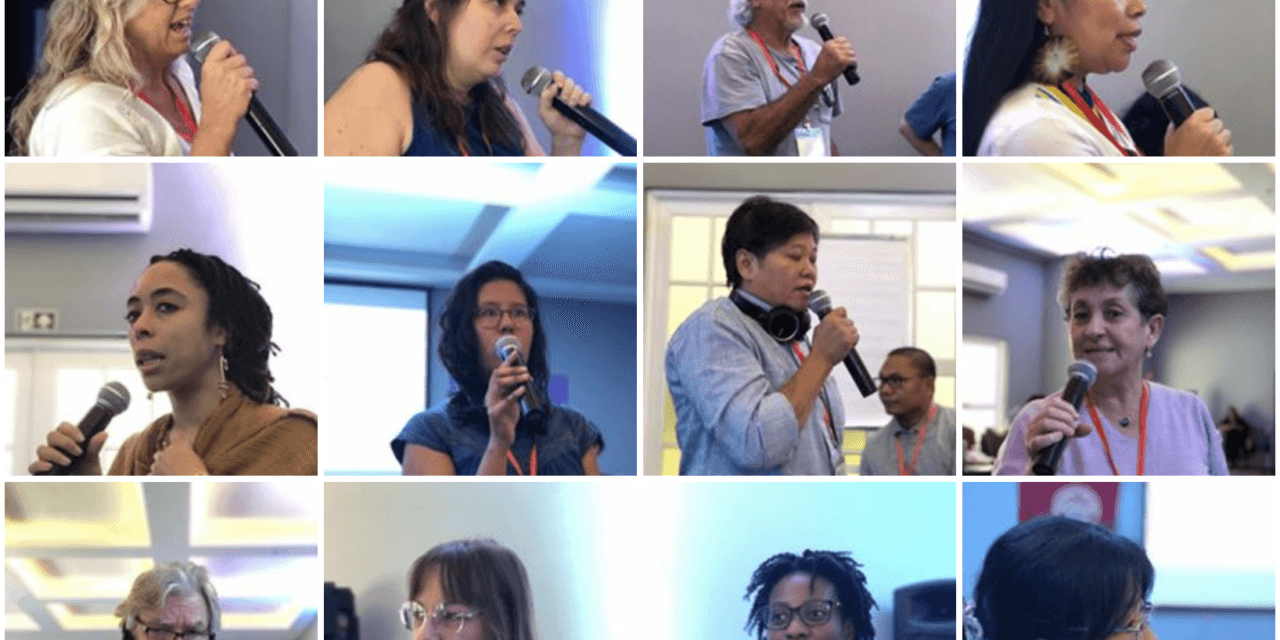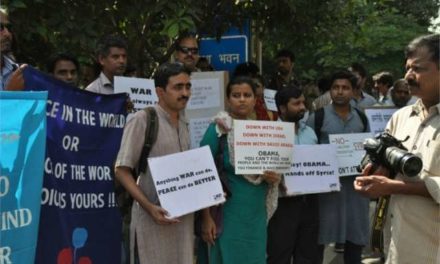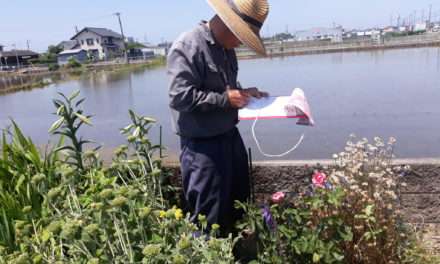[Español, Français] An important symposium took place in Itaipava (Brazil),7-9 April 2019[1]. Over 50 participants came out of the marathon to analyse new and persisting trends in the global situation, build and deepen relationships, strengthen alternatives for radical systemic change, and advance strategic thinking on the creation of alternatives. What was remarkable was the mix of resistance, resilience, hope and creativity, expressed by a very diverse group of people immersed in the vast global tapestry of popular and social movements.
Setting the scene
Renata Boulos (INCIDE), a long-time Brazilian activist, welcomed the participants on behalf of the organising team. Brazil’s new government is threatening people and popular movements with further repression in a country already plagued by huge social disparities and discrimination against poor people, Afro-Brazilians and indigenous peoples. Currently according to Renata, “those who struggle for our rights are defined as terrorists.” Other comrades from Brazil including Vitor Guimaraes (MTST), Clair Siobhan Ruppert (CUT), Frei Rodrigo Péret (Franciscan Action for ecology and solidarity), Tchenna Maso (MAB), Talles Reis (MST) insisted that Brazilian movements need now, more than ever, international solidarity.
Threats and challenges
Walden Bello (Focus on the Global South), a world-renowned economist and social activist, explained how the ultra-right wave spreading across our different countries has co-opted the language of the social movements. For Walden, the danger comes, when “left governments become bogged down in compromise, division and corruption, leading sections of the middle class to switch its support to authoritarian and far-right movements.” According to Pablo Solón (Fundación Solón, Bolivia), “the ultra-right highlighted the devastating effects of neoliberal globalization and then used that to bring about a culture of fear using racism, xenophobia and the fear of migrants”. Geneviève Azam (Attac, France) emphasized the dangers of ecological collapse affecting present and future generations, resulting from the destructions inflicted on Pachamama (Mother Earth) by capitalist globalization and extractivism. For Thenjiwe McHarris (Movement for Black Lives in the United States), we see “a tightening of the grip through a marriage of rhetoric, executive action and policy to organize society in a way that causes increased threat to women, girls, migrants, the poor, Queer folks, Black people and the young”.
Taking stock
Before turning to popular resistance and alternatives, participants concentrated on what went wrong in the previous phase when progressive forces were in a more offensive posture and sometimes in alliances with progressive governments. On these issues, there were many views. Pablo Solón explained that progressive governments, most notably in Latin America, “took some measures in favor of the poorest sectors and stopped privatization in some sectors. However, they did not break with neoliberalism or decentralize sectors of the economy towards democratically self-managed popular initiatives. They were unwilling to promote a logic of respect for nature that breaks with the logic of consumerism”. In the case of Brazil, said Douglas Belchior (UNEAfro, Brazil), an Afro-Brazilian activist, “the right came forward with proposals for its own technocratic, anti-democratic, militarised, racist, sexist, homophobic ‘modernisation’ and counter-reform.” For Shalmali Guttal (Focus on the Global South, Thaïland), “there is a limit of what a progressive government in a capitalist state can do, even with strong support of social movements. The Latin American experience shows that social movements have to stick to their own values and priorities, even when their political allies are in power.” Clair Siobhan Ruppert (Central Única dos Trabalhadores) reminded us “Brazil is a country with structural racism, well defined social classes and high inequality, with a high level of open class struggle and environmental destruction. Therefore, to have a president like Lula represents a lot. The PT struggle was a whole project of fighting against the biggest interests in the country. We were in government for 13 years and then there was a coup. Nevertheless. in that period, we moved forward, reducing poverty and introducing a minimum wage. After the coup there have been reforms taking labour rights back 100 years and social protection back 20 years”.
Opportunities
Following discussions about the current crisis in Venezuela and Nicaragua, Maristella Svampa (COnicEt, Argentina) suggested that “one thing is sure: we need to recognise the value of pluralism in our movements and refuse any notion of “supreme leadership” to which we surrender power and authority”. Inspired by Gramsci and Fanon, Thenjiwe McHarris concluded that popular and social movements needed to look to “engaging strategies that include fighting harmful policies, using electoral strategy when useful and using various mechanisms domestically and internationally to bring attention to suffering, violence and rights violations”. In addition, she added, “we need a clear ideology that is not only anti-capitalist, anti-patriarchal and anti-white supremacist, but articulates what we are for. This means redefining our relationship to land, food as well as finding ways to keep each other safe and find alternative ways to getting our people what they need to survive”. For Soraida A. Hussein (Women’s Affairs Technical Committee, Palestine it is interesting to see “how social movements are now more able to assess successes and failures, to identify new leaderships and new strategies. Central to any solution is to ensure that we focus on collective goals”.
The struggle within and in society
Cindy Wiesner (Grassroots Global Justice Alliance, US) and Hakima Abbas (AWID) (opened the discussion on social movements with a presentation of intersectional and grassroots feminisms. For Cindy Wiesner, “The focus is “to build beyond 2nd wave feminist politics on current progressive feminist currents, concentrating on the power dynamics of patriarchy, white supremacy and capitalism, and strategically promoting the leadership of black, Latina, LGBTQI peoples and indigenous women”. “I struggle with the approach of some black male comrades,” admitted Coumba Touré (Africans Rising, Senegal). “Every time a feminist stays something, the men rhetorically ask, ‘but what are the feminists doing about most women?’ But the same thing is not asked of men, the great leaders of our farmers’ movements!” Zahra Dalilah (KIN, UK) reminded us that “activist work inside our movement tends to be gender-segregated. There are always expectations that women will make the tea & do the administration.” For Stéphane Simpore (Queer African Youth Network, Burkina Faso), LGBTQI activists always must fight, so their voices can effectively challenge social movements when they remain indifferent to their causes and reflect the authoritarian and exclusive policies of the colonial era.
Democracy
While defending democracy and liberties against the far right offensive, movements are also promoting their own visions of democracy. Christophe Aguiton (Attac-France) gave the examples of the 2011 ‘M15’ citizens’ movement from Spain for participatory democracy. Paty Gualinga (Mujeres Amazonicas, Ecuador) reminded us “indigenous peoples have different forms and traditions of democracy.” None of these alternative democracies is free from internal conflicts. Religion and tradition are often used to justify conflicts over women’s and LGBTQI rights. Shalmali Guttal outlined the trend towards majoritarianism in Asia: “majoritarian governments claim a democratic mandate to exploit and destroy nature. This is invariably to the benefit of an urban middle class, with few or no benefits to working people rural communities and so-called minorities.” For indigenous people, it often means yet another wave of dispossession and destruction.
Energy for the People and the Earth Communities
For many governments and green capitalism lobbies, ‘energy transition’ means to replace fossil energy sources with renewable energy sources. However, what we really need is a transition to attack the root causes of the current crisis. Several participants reported that their movements are demanding that the state promote local energy projects not for export, but to transform these communities into producers. As Pablo Solónsuggested, “we need to go beyond a purely state level of ownership and control towards a community run and state supported hydro and solar system in our countries that can support productive and sustainable local livelihoods.” Along the same lines, Vedran Horvat (Institute for Political Ecology, Croatia), predicted that “any deep energy transition will undermine current models of growth and threaten those governments that are based on extractivism and the blind pursuit of capitalist growth.” Eriel Deranger (Indigenous Climate Action, Canada) pointed out that indigenous people have lived in energy poverty throughout the whole period of extraction of fossil fuels from their lands. “At the same time, we are modern people and we want access to energy. We need democratised energy systems. Localised, community-owned systems that are not dependent on extractivism to build indigenous energy sovereignty!”
In defense of the commons
Mary Lou Malig (Global Forest Coalition, Philippines) outlined the destructive dynamics of the global biomass industry: “When trees become private property, corporations want to get rid of the people who live among the trees. And yet, these small-scale farmers and indigenous people have a much more sustainable mixed land use approach that includes many trees alongside agriculture, livestock and small-scale processing industries.” Sia Anne Marie Kamano (We are the solution!, Guinea) discussed the experience of the West African women farmers movement ‘We are the solution!’ “Women find it hard to get access to land because the land use rules privilege men. Our movement helps women to get access to land, to use modern appropriate techniques and to commercialise their production. We embrace technology, but we always ask, ‘who benefits?’” Miguel de Barros(Tiniguena, Guinea Bissau) outlined the challenges facing fishing communities. “Governments and NGOs blame local fishing communities, who have developed models of sustainable management of coastal biodiversity over several hundred years. However, the real causes of biodiversity loss and increased flooding are commercial fishing by big corporations, large-scale tourism development, and migration from local fishing communities to urban centres”. Kingkorn Narintarakul (Biothai, Thailand) explained the efforts of the Biothai initiative to promote sustainable and ecological agriculture, working with farmers and consumers. “Thais eat five or six times a day. However, when we ask consumers where their food comes from, how it is produced, and by who, they do not know. So how can we say that Thais really choose the food that they consume every day?”
Convergences
The gradual dissemination across social movements of methodological approaches inspired by intersectionality are shifting organisational cultures and discouraging tendencies towards compartmentalisation and false hierarchies. The discussion around energy transition highlighted the convergence of environmentalist, land defenders and anti-capitalist initiatives. Many participants also foregrounded the impact of climate change and extractivism on women, systemically marginalised communities and the indigenous. According to Gabriela Linares Sosa (Union of organizations of Sierra Juarez, Mexico), deglobalisation discussions exposed the links between governments – including the most progressive – and capitalist interests. “The food sovereignty approach helps social movements to articulate an emancipatory approach to political engagement and movement building”. Ala Talbi (Tunisian Forum for social and economic rights) suggested to move the discussion around the commons beyond the old debate about “privatisation vs state ownership”, and to foreground social, collective forms of management and control. Most participants agreed that the debate in the social movements today is no longer about whether to integrate multiple systemic alternatives into programme and activities, but rather how far to go in this process.
Resourcing systemic alternatives
During the last decade, the rising power of social movements created favourable conditions for increased donor, philanthropic and progressive government support to progressive social movements. The next decade will not be so easy. Many organisations face the difficult choice between directing resources to address urgent needs or neglecting this dimension of solidarity with the communities where they work. Several participants analysed the political economy of “aid” in the communities where they work, the challenge of NGO-ization and co-option of social movements, imposition of donors’ geographical and thematic priorities, capture of programmes by local elites for private benefit. Soraida Hussein (Women’s Technical Affairs Committee, Palestine) insisted that donors “should respect organizations and avoid short term projects in favour of longer engagement to build local capacities”. Political conditionality on grantees must be resisted! “Donors and the Philanthropy sector should also be more transparent”, said Karen Nansen (Amigos de la Tierra Internacional, Uruguay). They need to engage civil society organisations more in the planning and management of grant schemes. Participants also discussed positive collaboration between donors and social movements to identify appropriate measurements of impact or ‘success’ of grant support, and to simplify administrative procedures as far as possible.
Looking forward
For many participants, the value of a project like Systemic Alternatives is to identify the maximum common ground and areas of convergence between social movements working on various systemic alternatives. For Hakima Abbas (AWID), the positive experience of the Symposium confirms the “potential for structuring debates in a respectful and emancipatory framework, facilitating networking and cross-fertilisation, and supporting social movements as they reclaim politics and articulate new forms of people’s power”. Looking forward, participants identified the challenge of widening participation, reaching out to a broader range of social movements and networks, particularly the emerging youth-led feminist climate change and labor movements. Other key issues to be addressed include issues of freedom and liberties, secularism, technology, internet, knowledge management and communications, social protection systems, relationship between social movements and the state (themes such as municipal progressive alternatives, state funding for social movements and CSOs). According to Maduresh Kumar (National Alliance of People’s Movements, India), it is essential “to engage with a mixture of ‘old’, ‘new’ and ‘newest’ social movements, on the transformation of work, both paid work in the context of degrowth and unpaid reproduction and care work. Not only is the social contract broken, but also basic rights and liberties are under threat. Other participants suggested that in such a context, there are possibilities to develop progressive-led alliances with the democratic/liberal minded middle classes. Faced with the rise of right-wing authoritarianism, some participants suggested that Systemic Alternatives focus on the fight-back”. Walden Bello put it directly: “what we need is for this movement to develop into a global anti-fascist front!”.
[1] The meeting was organized jointly by Systemic Alternatives ( a project undertaken by Fundación Solón, Attac-France, Focus on Global South and Intercoll) and a facilitation team composed of (in alphabetical order): Hakima Abbas (Association for Women’s Rights in Development, Africa), , Christophe Aguiton (Attac, France), Pierre Beaudet (Intercoll, Canada), Renata Boulos (INCIDE, Brazil) Raphael Canet Rise (Canada), Shalmali Guttal (Focus on Global South, Thailand), Pablo Solon (Fundación Solón, Bolivia) and Cindy Wiesner (Grassroots Global Justice Alliance, USA), with the support of Mark Randazzo (Edge Funders Alliance, USA). For more information on Systemic Alternatives and other documents related to the symposium: https://systemicalternatives.org/










